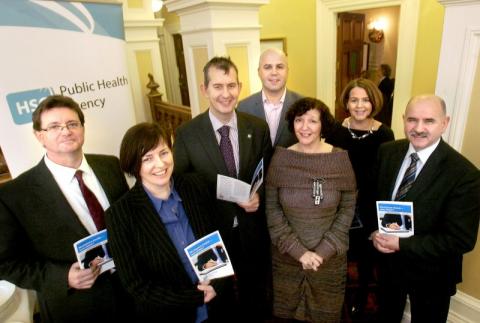Sharing time, skills and knowledge to improve health and wellbeing

The Public Health Agency (PHA), in partnership with Business in the Community and the Northern Ireland Confederation for Health and Social Care (NICON) hosted a breakfast seminar at Belfast Castle this morning (14 December) attended by more than 30 leaders from the public, private and community and voluntary sectors.
Those attending the ‘Workplace health – the next steps’ seminar considered how they can improve health and wellbeing and help tackle inequalities.
Speaking at the event, Professor Stephen Bevan from the Work Foundation, based at Lancaster University, talked about the role work leaders can play in sharing the skills and knowledge of employees and organisations to help local communities (known as corporate social responsibility). Ciaran Sheehan, Business in the Community, used ‘Colin Care’ as an example of good practice to explain what can be achieved when businesses engage with communities to improve health and wellbeing.
Explaining the importance of this work, Dr Eddie Rooney, Chief Executive, PHA, said: “This seminar was the first step for the PHA, working with Business in the Community and NICON, and I am delighted that Stephen Bevan was able to attend. His background which includes working with a number of government departments and many blue chip companies, along with promoting active policies to improve labour market participation among people with long-term health conditions, means he has a lot to contribute to our local developments in this area.
”We are acutely aware of the valuable work that has already been done by many businesses, large and small, and their representative bodies in this area. The PHA has an important role, working in partnership to identify and meet health and wellbeing needs across Northern Ireland.
“It is pleasing to see that so many senior people from a broad spectrum of organisations gave up their time to attend this event and are committed to developing the next important steps.”
Health Minister Edwin Poots said: “The health and wellbeing of our working age people impact on our outputs, productivity, our competitiveness and ultimately on our economic success. Work is a fundamental part of our lives and it can give us a sense of belonging and can provide us with a sense of purpose. It can also provide opportunities for social interaction.”
Finding ways of participating in the community to improve the health of workers, their families and other members of the community, is part of the World Health Organisation’s definition of a ‘healthy workplace’ [1]. The PHA is working with key partners to encourage more employers to develop ‘healthy workplaces’, for their employees and local communities and so have a positive impact on the people, places and communities in which employees live and work.
More than 30 leaders from government departments, local authorities, education, health and social care, the voluntary sector and private companies attended the breakfast seminar, where they explored the challenges, examples of good practice already taking place and discussed what they could do to build on this work in the future.
Contact the PHA Press Office on 028 9031 1611
Picture caption
Pictured at the ‘Workplace health – next steps?’ breakfast seminar, held today (14 December) at Belfast Castle are (L-R) Stephen Bevan, Director, The Work Foundation at Lancaster University; Roisin Murray, HR Manager, W5 @ Odyssey; Edwin Poots, MLA, Minister for Health, Social Services and Public Safety; Ciaran Sheehan, Board member, Business in the Community; Heather Moorhead, Director, Northern Ireland Confederation for Health and Social Care (NICON); Jackie Henry, Partner, Deloitte and Dr Eddie Rooney, Chief Executive, The Public Health Agency (PHA). More than 30 leaders from the public, private and community and voluntary sectors attended the joint seminar, by the PHA, Business in the Community and NICON, to consider how they can improve health and wellbeing and help tackle inequalities.
- The Public Health Agency was set up to promote and enhance the factors that influence good health and wellbeing and to reduce the avoidable and unjust differences in health experienced between the best and the worst-off in our society. This is done by working in partnership with the community and a wide range of organisations from across all sectors.
- Business in the Community (BITC) stands for responsible business. It is a solutions-driven membership organisation for successful companies committed to doing business in a responsible way which helps them impact positively on their People, the Planet and the Places where they operate. In Northern Ireland, Business in the Community has a growing membership of almost 250 members and has a particular focus on youth and those who are disadvantaged.
- The Northern Ireland Confederation for Health and Social Care, commonly known as NICON , is a membership body for the organisations that make up the Health and Social Care system in N Ireland. Membership of NICON includes;
- Commissioning Bodies; the Health and Social Care Board, the Public Health Agency and the Local Commissioning Groups,
- Service delivery organisations; the five Health and Social Care Trusts and the Ambulance Service
- Support agencies; Business Services Organisation, Regulation and Quality Improvement Authority, Social Care Board, NI Practice and Education Council, the Beeches Management Centre and the Patient Client Council
- ‘Colin Care’ is an innovative social enterprise business in the Colin area of Belfast/Lisburn. It currently employs 40 people, the majority of whom were previously unemployed.
References
[1] Burton J. WHO Healthy Workplace Framework and Model: Background and Supporting Literature and Practice. Geneva: World Health Organization; 2010. www.who.int/occupational_health/healthy_workplace_framework.pdf
